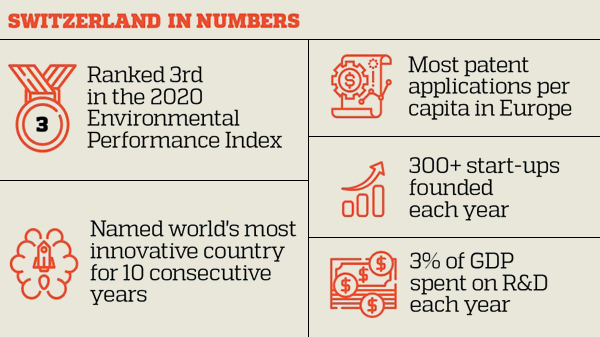Innovation / Switzerland
Swiss cleantech for a better world
Green solutions developed in Switzerland lead the way as global businesses gear up for a major sustainability push.

Panoramic view of Lucerne old town. © Lucerne Business
First thoughts about Switzerland’s leading products run to cheese, chocolate and watches, but companies gearing their products to sustainability initiatives are certainly becoming a trademark for one of the most sustainable countries in the world.
Indeed, Swiss companies in a wide range of industries have not only embraced sustainability, they have made it a significant part of their core strategy. This isn’t merely a good business practice or opportunity; it’s enshrined in the country’s constitution, with the aim of “a balanced relationship between nature and its ability to renew itself, on the one hand, and the demands placed by the human race, on the other”.
Like other signatory countries of the Paris Climate Agreement, Switzerland seeks to attain climate neutrality by 2050. This goal, however, seemingly hit a snag in June when voters narrowly rejected a law aiming to cut greenhouse gas emissions which have been rising faster than in other countries. The so-called CO2 law was aimed at targeting various emitters such as cars, air traffic and industry, with those reducing their emissions standing to benefit.

Climate change is certainly an important topic for a country where mountains and winter sports are part of the national identity. According to a report issued by the Federal Office for the Environment (FOEN) in 2020, the average temperature has risen by two degrees Celsius and greenhouse gas emissions have increased sixfold between 1900 and 2018, causing glaciers to gradually recede. Facing such climate challenges, Swiss businesses are increasingly embracing sustainability as a business model, with solutions that have a global reach, and thus potentially a significant influence on reducing CO2 emissions and other types of pollution.
Oerlikon CEO Roland Fischer might well be speaking for a number of Swiss companies when he says “sustainability has always been a key element of our business and strategy,” and sees innovation as a way to achieve it. Holcim is one such company pursuing this idea, having combined its sustainability and innovation business portfolios under one executive, and introducing products such as its “green” concrete with a 30 to 100 percent lower carbon footprint than traditional concrete.

Joël Mesot, President of ETH Zurich ©ETH
“I have one word for you: plastics”
Those who have seen the film “The Graduate” are likely familiar with the quote “I have one word for you: plastics.” Plastic is becoming a major part of the sustainability conversation and the Paris Climate Agreement is encouraging industries to find new solutions.
The UTZ Group is a family business founded in Switzerland in 1947 with locations currently on three continents, and a particular eye on expanding in the U.S. Plastic is a material offering superior characteristics for packaging in terms of technical and physical considerations in relation to weight and “is only harmful when it is single-use,” according to company CEO Axel Ritzberger. Key to sustainability is a circular economy, and accordingly “UTZ designs products on a certified cradle-to-cradle basis, so they can be recycled and their overall carbon footprint can be reduced,” Ritzberger says.

Axel Ritzberger, CEO of UTZ Group ©UTZ
Like counterparts at much larger public companies, UTZ is ramping up investment in the U.S., to the tune of millions of dollars in the “double-digit” range, including a new production site. “UTZ Group leads the Swiss plastic industry with a 25 percent recycling rate, setting an example globally. This is the future because resources are limited and must be managed in a loop”, Ritzberger says. Pointing out that “our business strategy is aligned with our climate strategy”, he says that UTZ Group is very healthy and energy efficient already, and that the company already offers services and products that meet U.S. carbon targets for 2030 and has a clear path to carbon reduction.
Another interesting enterprise is Bern-based BKW, an international energy and infrastructure company offering integrated solutions in energy, buildings and infrastructure. BKW CEO Suzanne Thoma sees challenges posed by customers as an opportunity. “Buildings can be important sources of energy production,” she says, which offers the company a growing market.
New approaches are not coming just from the business world. One only needs to look at the canton of Basel-Stadt, where new and innovative business models are taking shape in several former industrial areas, especially relating to the circular economy.
Yale University’s Environmental Performance Index suggests that innovation is good not only for the bottom line, but it also translates into sustainability metrics, with Switzerland ranked third behind Denmark and Luxembourg in 2020’s EPI. By adopting a global outlook, Swiss enterprises are embracing challenges as a business opportunity to make the world more sustainable.
